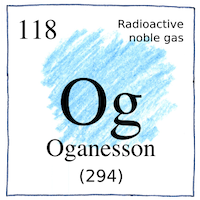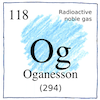Oganesson
Russian and American scientists at Dubna bombarded californium-249 with ions of calcium-48 and measured three decay events, oganesson-294 decaying to livermorium-290, livermorium-290 decaying to flerovium-286, and flerovium-286 decaying to copernicium-282.
Atomic number 118
Only three or four atoms have been detected. Only one isotope has been sythesized, so far, with a half life of less than a millisecond. Other isotopes, if they could be synthesized, could have longer half lives.
An end
This end is probably not the final end. Oganesson could have more isotopes and each could be more stable than expected. The periodic table could have another row and ever more clever analyses could show some improbabilities could become realities.




Some expect oganesson to be a gas at room temperatures, but relativistic effects might make it a solid. Before it could be proven to be a solid, its atoms would need to last long enough for two or more to be put together.
See also in The book of science:
Readings in wikipedia:
Other readings: